Qualified teams
The top two placed teams from each of the two groups qualified for the knockout stage.
| Group | Winners | Runners-up |
|---|---|---|
| 1 | ||
| 2 |
The knockout stage of UEFA Euro 1988 was a single-elimination tournament involving the four teams that qualified from the group stage of the tournament. There were two rounds of matches: a semi-final stage leading to the final to decide the champions. The knockout stage began with the semi-finals on 21 June and ended with the final on 25 June 1988 at the Olympiastadion in Munich. The Netherlands won the tournament with a 2–0 victory over the Soviet Union. [1]
All times Central European Summer Time (UTC+2)
Any game in the knockout stage that was undecided by the end of the regular 90 minutes was followed by thirty minutes of extra time (two 15-minute halves). If scores were still level after 30 minutes of extra time, there would be a penalty shootout (at least five penalties each, and more if necessary) to determine who progressed to the next round. As with every tournament since UEFA Euro 1984, there was no third place play-off.
The top two placed teams from each of the two groups qualified for the knockout stage.
| Group | Winners | Runners-up |
|---|---|---|
| 1 | ||
| 2 |
| Semi-finals | Final | |||||
| 22 June – Stuttgart | ||||||
| 2 | ||||||
| 25 June – Munich | ||||||
| 0 | ||||||
| 0 | ||||||
| 21 June – Hamburg | ||||||
| 2 | ||||||
| 1 | ||||||
| 2 | ||||||
| West Germany | 1–2 | |
|---|---|---|
| Report |
|
West Germany | Netherlands |
|  |
| |||||||||||||||||||||||||||||||||||||||||||||||||||||||||||||||||||||||||||||||||||||||||||||||||||||||||||||||||||||
Linesmen: |
| Soviet Union | 2–0 | |
|---|---|---|
| Report |
Soviet Union | Italy |
| 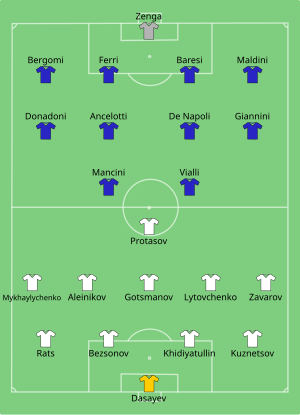 |
| ||||||||||||||||||||||||||||||||||||||||||||||||||||||||||||||||||||||||||||||||||||||||||||||||||||||||||||||||||
Linesmen: |
| Soviet Union | 0–2 | |
|---|---|---|
| Report |
|
Soviet Union | Netherlands |
| 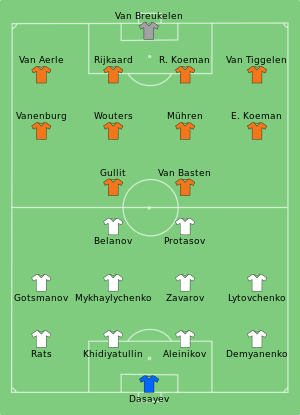 |
| ||||||||||||||||||||||||||||||||||||||||||||||||||||||||||||||||||||||||||||||||||||||||||||||||||||||||
Linesmen: [3] |

The 1974 FIFA World Cup was the tenth FIFA World Cup, a quadrennial football tournament for men's senior national teams, and was played in West Germany between 13 June and 7 July. The tournament marked the first time that the current trophy, the FIFA World Cup Trophy, created by the Italian sculptor Silvio Gazzaniga, was awarded. The previous trophy, the Jules Rimet Trophy, had been won for the third time by Brazil in 1970 and awarded permanently to the Brazilians. This was the first out of three World Cups to feature two rounds of group stages.
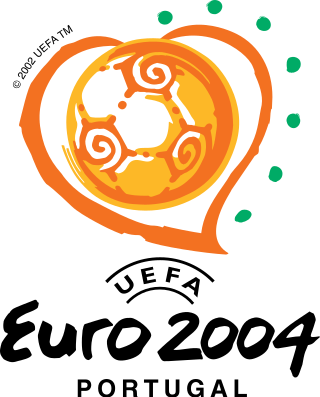
The 2004 UEFA European Football Championship, commonly referred to as Euro 2004, was the 12th edition of the UEFA European Championship, a quadrennial football competition contested by the men's national teams of UEFA member associations. The final tournament was hosted for the first time in Portugal, from 12 June to 4 July 2004. A total of 31 matches were played in ten venues across eight cities – Aveiro, Braga, Coimbra, Guimarães, Faro/Loulé, Leiria, Lisbon, and Porto.

The 2000 UEFA European Football Championship, also known as Euro 2000, was the 11th UEFA European Championship, a football tournament held every four years and organised by UEFA, the sport's governing body in Europe.
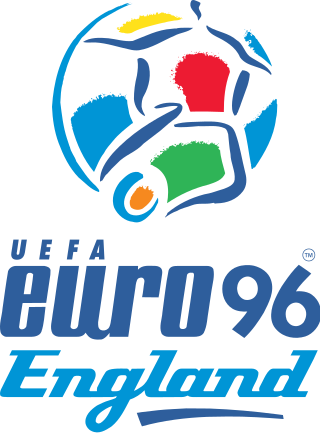
The 1996 UEFA European Football Championship, commonly referred to as Euro 96, was the 10th UEFA European Championship, a quadrennial football tournament contested by European nations and organised by UEFA. It took place in England from 8 to 30 June 1996. It was the first European Championship to feature 16 finalists, following UEFA's decision to expand the tournament from eight teams.

The 1992 UEFA European Football Championship was hosted by Sweden between 10 and 26 June 1992. It was the ninth UEFA European Championship, which is held every four years and supported by UEFA.

The 1988 UEFA European Football Championship final tournament was held in West Germany from 10 to 25 June 1988. It was the eighth UEFA European Championship, which is held every four years and supported by UEFA.

The 1984 UEFA European Football Championship final tournament was held in France from 12 to 27 June 1984. It was the seventh UEFA European Championship, a competition held every four years and endorsed by UEFA.
The knockout stage of UEFA Euro 2004 was a single-elimination tournament involving the eight teams that qualified from the group stage of the tournament. There were three rounds of matches, with each round eliminating half of the teams entering that round, culminating in the final to decide the champions. The knockout stage began with the quarter-finals on 24 June and ended with the final on 4 July 2004 at the Estádio da Luz in Lisbon. Greece won the tournament with a 1–0 victory over the host nation Portugal.
The knockout stage of UEFA Euro 2008 began with the quarter-finals on 19 June 2008, and was completed on 29 June 2008 with the final at Ernst-Happel-Stadion in Vienna.
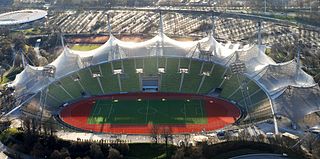
The UEFA Euro 1988 final was the final match of UEFA Euro 1988, the eighth UEFA European Football Championship, UEFA's top football competition for national teams. The match was played at the Olympiastadion in Munich, Germany, on 25 June 1988 and was contested by the Netherlands and the Soviet Union. The Netherlands and the Soviet Union were both drawn in UEFA Euro 1988 Group 2, alongside the Republic of Ireland and England. The Soviet Union finished on top of the group and defeated Italy to qualify for their fourth European Championship final. The Netherlands ended the group stage in second place and beat West Germany in their semi-final to progress to their first European Championship final.
The knockout stage of UEFA Euro 1992 was a single-elimination tournament involving the four teams that qualified from the group stage of the tournament. There were two rounds of matches: a semi-final stage leading to the final to decide the champions. The knockout stage began with the semi-finals on 21 June and ended with the final on 26 June 1992 at the Ullevi in Gothenburg. Denmark won the tournament with a 2–0 victory over Germany.
The knockout stage of UEFA Euro 2000 started with the first quarter-final on 24 June and ended with the final on 2 July 2000.
The knockout stage of the 1994–95 UEFA Champions League began on 1 March 1995 and ended with the final at the Ernst-Happel-Stadion in Vienna on 24 May 1995. The top two teams from each of the four groups in the group stage competed in the knockout stage. For the quarter-finals, each group winner was randomly drawn against the runner-up from another group, with the group winner hosting the second leg. The four quarter-final winners were then drawn together for the semi-finals, the winners of which contested the final.
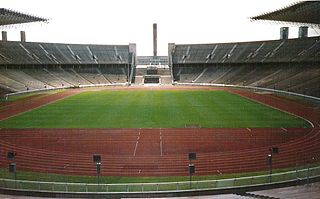
The Four Nations Tournament was an invitational association football competition between four national teams, organized by the German Football Association (DFB). The teams of West Germany, Soviet Union, Argentina and Sweden competed against one another at Olympic Stadium, West Berlin from 31 March to 2 April 1988, with Sweden the tournament winners.
The knockout stage of the 1997–98 UEFA Champions League began on 4 March 1998 and ended with the final at the Amsterdam Arena in Amsterdam on 20 May 1998. The six group winners in the group stage, as well as the two best runners-up, competed in the knockout stage. For the quarter-finals, two group winners were randomly drawn against the two best runners-up from another group while the other four group winners face against each other with the restriction that two best runners-up cannot be drawn against the winners of their own group. The knockout stage was then played as a single-elimination tournament.
The knockout stage of the 2000–01 UEFA Champions League featured the eight teams that had finished in the top two of each of the four groups in the second group stage and lasted from 3 April to 23 May 2001. The knockout stage followed a simple, single-elimination format, with the ties in each round being played over two legs, with whichever team scored the most goals over the course of the two legs progressing to the next round. In the case of both teams scoring the same number of goals over the two legs, the winner would be determined by whichever team scored more goals in their away leg. If the teams could still not be separated, a period of golden goal extra time lasting 30 minutes would be played. If no goals are scored after extra time, the winner would be decided by a penalty shoot-out. As in every season of the competition, the final was played as a single match at a neutral venue, which in 2001 was the San Siro in Milan, Italy.
The UEFA European Championship is the main football competition of the men's national football teams governed by UEFA. Held every four years since 1960, in the even-numbered year between FIFA World Cup tournaments, it was originally called the UEFA European Nations' Cup, changing to the current name in 1968.
The knockout stage of UEFA Euro 1984 was a single-elimination tournament involving the four teams that qualified from the group stage of the tournament. There were two rounds of matches: a semi-final stage leading to the final to decide the champions. The knockout stage began with the semi-finals on 23 June and ended with the final on 27 June at the Parc des Princes in Paris. France won the tournament with a 2–0 victory over Spain.
The final tournament of UEFA Euro 1976 was a single-elimination tournament involving the four teams that qualified from the quarter-finals. There were two rounds of matches: a semi-final stage leading to the final to decide the champions. The final tournament began with the semi-finals on 16 June and ended with the final on 20 June at the Stadion Crvena zvezda in Belgrade. Czechoslovakia won the tournament with a 5–3 penalty shoot-out victory over West Germany.
The knockout stage of UEFA Euro 2024 began on 29 June 2024 with the round of 16 and will end on 14 July 2024 with the final at Olympiastadion in Berlin, Germany.